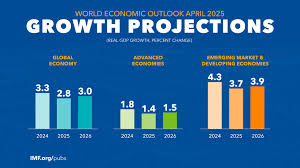The Global Economy in 2025: Reshaping Growth in a Connected World

Introduction
The world economy in 2025 is navigating a new era—an era driven by digital transformation, sustainable innovation, and shifting geopolitical landscapes. Following the disruptions of the early 2020s, countries and corporations are now focused on building resilience, fostering innovation, and redefining economic priorities.
From green investment booms to digital currencies and changing labor dynamics, the global economy is evolving at an unprecedented pace. Here’s a look at the major forces shaping the economic landscape in 2025—and where we’re headed next.
1. Digital Currencies and Decentralized Finance Go Mainstream
In 2025, digital finance has moved beyond buzzwords and into everyday reality. Central Bank Digital Currencies (CBDCs) are now being used in multiple countries, while blockchain-based systems offer faster, more secure transactions.
Key developments:
- National governments issuing and regulating digital currencies
- Increased trust in decentralized finance (DeFi) platforms
- Financial inclusion in underserved regions through mobile banking
What it means: The global financial system is becoming more accessible, efficient, and decentralized.
2. Sustainability Is Driving Economic Strategy
Climate action is now an economic imperative. Governments and businesses are investing heavily in green technologies, clean energy, and sustainable infrastructure.
Sustainability-focused shifts:
- Surge in green bonds and ESG (Environmental, Social, and Governance) investing
- Jobs growth in renewable energy and circular economies
- Government incentives for carbon-neutral manufacturing and transportation
Long-term benefit: Economies that embrace green innovation are creating new industries and future-proofing their growth.
3. Artificial Intelligence Transforms Productivity
AI is now a cornerstone of global productivity. From supply chain management to financial forecasting, businesses are leveraging AI to reduce costs, streamline operations, and drive innovation.
AI in the economy:
- Automation of routine jobs in finance, logistics, and manufacturing
- AI-driven tools assisting decision-making in real time
- Digital assistants replacing traditional customer service models
Result: Economies are more efficient—but also facing the challenge of reskilling workforces for the AI age.
4. A New Era of Work: Remote, Flexible, and Skill-Based
The 9-to-5 model is being replaced by flexible, hybrid, and skills-first work environments. Workers are prioritizing balance, purpose, and professional development.
Workforce trends in 2025:
- Remote and freelance work continues to rise
- Companies hiring for skills over degrees
- Platforms for digital upskilling and micro-certifications booming
Economic impact: Nations that invest in lifelong learning are seeing stronger, more adaptable labor markets.
5. Global Trade: Fragmented but Fast-Moving
Geopolitical tensions, supply chain disruptions, and regional trade agreements are reshaping global commerce. The post-globalization era is more fragmented, but also more agile.
Global trade in 2025:
- Nearshoring and friend-shoring replacing traditional outsourcing
- Regional trade blocs (like ASEAN, African Continental Free Trade Area) growing stronger
- Digital trade platforms reducing barriers for SMEs
Takeaway: Localized trade resilience is becoming just as valuable as global reach.
6. Small Business and Entrepreneurship Thrive in the Digital Economy
Technology has empowered entrepreneurs like never before. In 2025, launching a global business can be done from a smartphone—giving rise to a new wave of digital-first microbusinesses.
Entrepreneurial drivers:
- E-commerce platforms with global shipping capabilities
- Subscription services and niche product brands
- AI tools making branding, marketing, and analytics accessible to solopreneurs
Future outlook: The economy is no longer dominated by corporations alone—small businesses are key engines of innovation.
Conclusion
The economy of 2025 is defined by adaptability, inclusion, and sustainability. It’s no longer just about growth—it’s about how we grow. Whether through technology, green innovation, or human-centered work models, the world is moving toward a more interconnected and thoughtful economic future.
Success in this landscape requires agility, collaboration, and a commitment to long-term value over short-term gains. The next chapter of global growth is being written right now—and everyone has a role to play.




